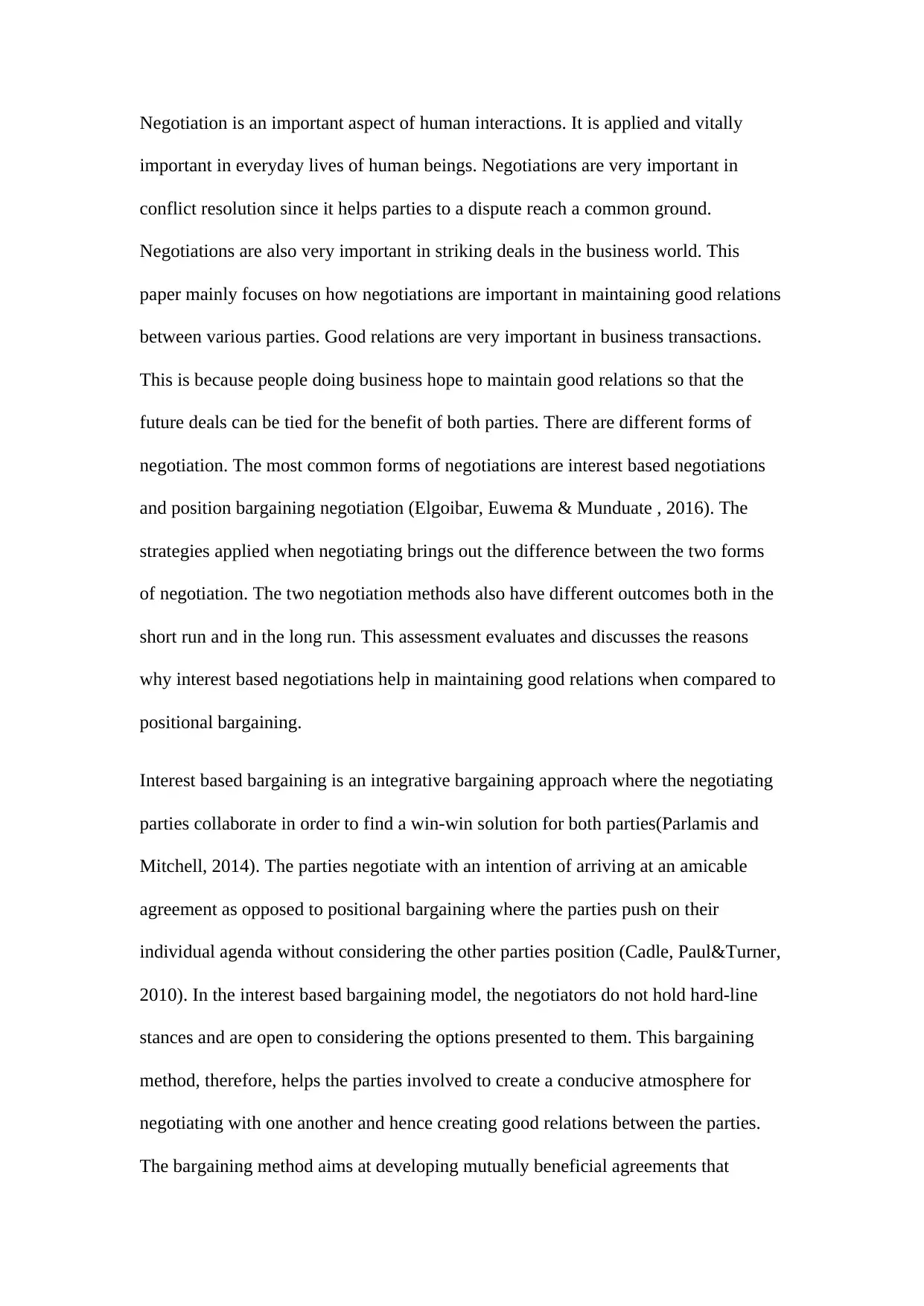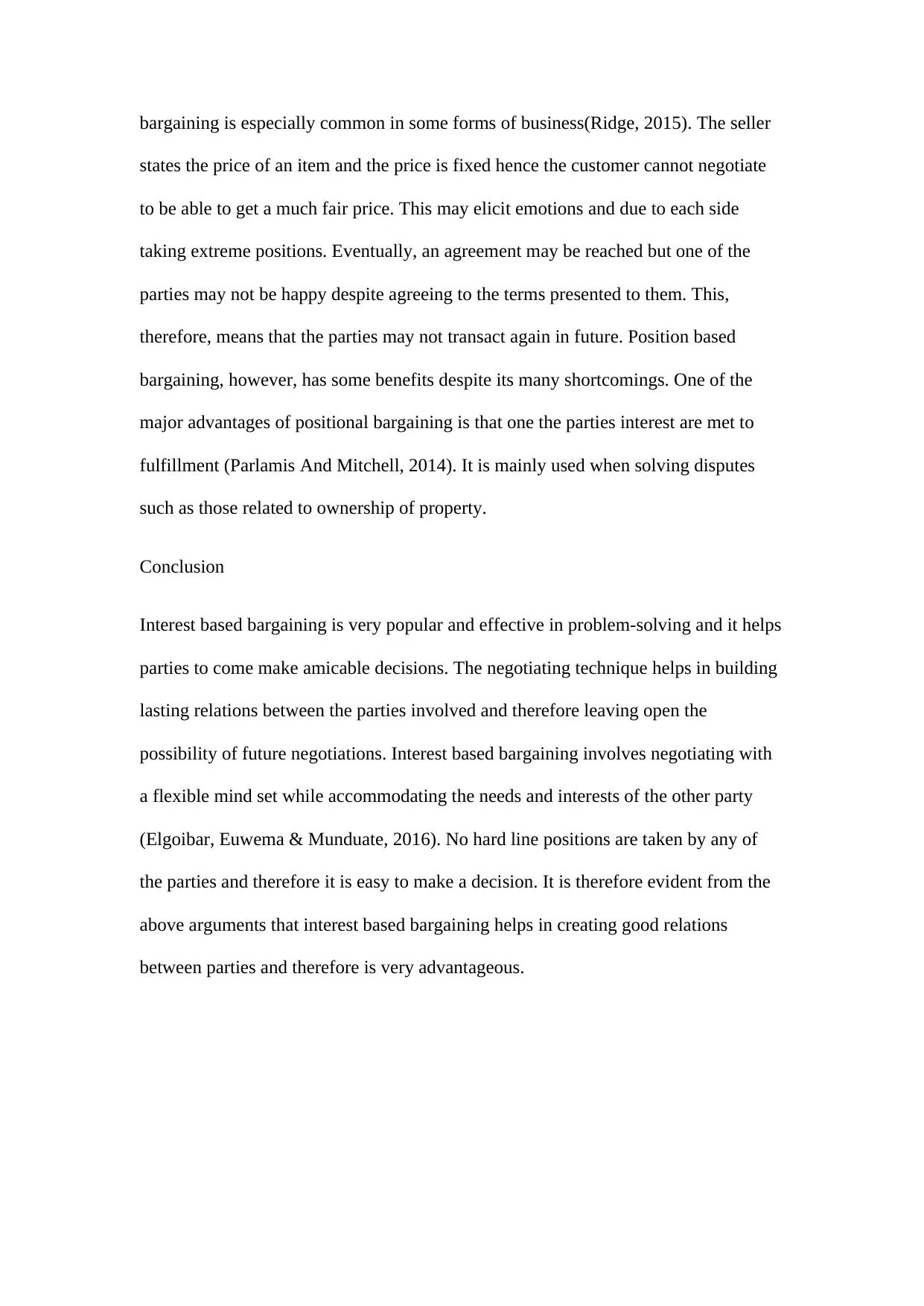Analyzing Negotiation Methods: Business Relations and Outcomes
VerifiedAdded on 2020/02/18
|5
|1164
|40
Essay
AI Summary
This essay examines the significance of negotiation in fostering positive business relationships. It contrasts two primary negotiation methods: interest-based bargaining and positional bargaining. Interest-based negotiation, characterized by collaboration and a win-win approach, is presented as superior for maintaining good relations due to its focus on mutual interests, respect, and long-term benefits like customer loyalty. Conversely, positional bargaining, with its rigid stances, is shown to be less conducive to lasting relationships, despite potentially achieving immediate goals. The essay highlights the importance of interest-based strategies in building trust, encouraging repeat business, and achieving mutually beneficial outcomes in various business contexts. References include academic journals and books on negotiation and business analysis.

Name
Institution
Course Name
Course Code
Instructor
Date
Institution
Course Name
Course Code
Instructor
Date
Paraphrase This Document
Need a fresh take? Get an instant paraphrase of this document with our AI Paraphraser

Negotiation is an important aspect of human interactions. It is applied and vitally
important in everyday lives of human beings. Negotiations are very important in
conflict resolution since it helps parties to a dispute reach a common ground.
Negotiations are also very important in striking deals in the business world. This
paper mainly focuses on how negotiations are important in maintaining good relations
between various parties. Good relations are very important in business transactions.
This is because people doing business hope to maintain good relations so that the
future deals can be tied for the benefit of both parties. There are different forms of
negotiation. The most common forms of negotiations are interest based negotiations
and position bargaining negotiation (Elgoibar, Euwema & Munduate , 2016). The
strategies applied when negotiating brings out the difference between the two forms
of negotiation. The two negotiation methods also have different outcomes both in the
short run and in the long run. This assessment evaluates and discusses the reasons
why interest based negotiations help in maintaining good relations when compared to
positional bargaining.
Interest based bargaining is an integrative bargaining approach where the negotiating
parties collaborate in order to find a win-win solution for both parties(Parlamis and
Mitchell, 2014). The parties negotiate with an intention of arriving at an amicable
agreement as opposed to positional bargaining where the parties push on their
individual agenda without considering the other parties position (Cadle, Paul&Turner,
2010). In the interest based bargaining model, the negotiators do not hold hard-line
stances and are open to considering the options presented to them. This bargaining
method, therefore, helps the parties involved to create a conducive atmosphere for
negotiating with one another and hence creating good relations between the parties.
The bargaining method aims at developing mutually beneficial agreements that
important in everyday lives of human beings. Negotiations are very important in
conflict resolution since it helps parties to a dispute reach a common ground.
Negotiations are also very important in striking deals in the business world. This
paper mainly focuses on how negotiations are important in maintaining good relations
between various parties. Good relations are very important in business transactions.
This is because people doing business hope to maintain good relations so that the
future deals can be tied for the benefit of both parties. There are different forms of
negotiation. The most common forms of negotiations are interest based negotiations
and position bargaining negotiation (Elgoibar, Euwema & Munduate , 2016). The
strategies applied when negotiating brings out the difference between the two forms
of negotiation. The two negotiation methods also have different outcomes both in the
short run and in the long run. This assessment evaluates and discusses the reasons
why interest based negotiations help in maintaining good relations when compared to
positional bargaining.
Interest based bargaining is an integrative bargaining approach where the negotiating
parties collaborate in order to find a win-win solution for both parties(Parlamis and
Mitchell, 2014). The parties negotiate with an intention of arriving at an amicable
agreement as opposed to positional bargaining where the parties push on their
individual agenda without considering the other parties position (Cadle, Paul&Turner,
2010). In the interest based bargaining model, the negotiators do not hold hard-line
stances and are open to considering the options presented to them. This bargaining
method, therefore, helps the parties involved to create a conducive atmosphere for
negotiating with one another and hence creating good relations between the parties.
The bargaining method aims at developing mutually beneficial agreements that

considers the interests of both parties (Parlamis and Mitchell, 2014). These interests
may include the needs, concerns and financial interests. The negotiations are carried
out with the aim of ensuring that at the end of the deal, each of the parties to the
negotiations goes home happy and satisfied with the decision that has been arrived.
This, therefore, means that the parties will be happy with one another and will look
forward to carrying out business with one another in future. Another reason why
interest based negotiations are better than position bargaining is that interest based
bargaining will bring about warm feelings between the parties when they realize that
they both are negotiating in good faith. They eventually end up establishing lasting
contacts because of the great respect and admiration they develop for one another.
These contacts can be helpful to both parties when they get another chance to
negotiate or do business together. For many companies and individual business
persons, the aspect of negotiations is key in attracting new customers and in retaining
old ones. Customers are very concerned by how the seller approaches them and the
way they negotiate with the customer (Starkey, Boyer, Wilkenfeld &Starkey, 2010).
If a client notices that the seller puts their interest in the balance when making a
business decision, they tend to feel some gratitude towards the other party. This is
repaid by continued buying which may eventually develop to customer loyalty. In the
long run, both parties will end up benefiting greatly from the relationship created as a
result of interest based bargaining.
Position based bargaining is not favorable for maintaining good relations because of a
variety of reasons. Positional bargaining involves holding fixed positions or
arguments that are not adjusted under whatever circumstances. Parties to negotiations
state their positions in regard to a particular issue and none of them is willing to
abandon their position for the common good or in favor of another. Positional
may include the needs, concerns and financial interests. The negotiations are carried
out with the aim of ensuring that at the end of the deal, each of the parties to the
negotiations goes home happy and satisfied with the decision that has been arrived.
This, therefore, means that the parties will be happy with one another and will look
forward to carrying out business with one another in future. Another reason why
interest based negotiations are better than position bargaining is that interest based
bargaining will bring about warm feelings between the parties when they realize that
they both are negotiating in good faith. They eventually end up establishing lasting
contacts because of the great respect and admiration they develop for one another.
These contacts can be helpful to both parties when they get another chance to
negotiate or do business together. For many companies and individual business
persons, the aspect of negotiations is key in attracting new customers and in retaining
old ones. Customers are very concerned by how the seller approaches them and the
way they negotiate with the customer (Starkey, Boyer, Wilkenfeld &Starkey, 2010).
If a client notices that the seller puts their interest in the balance when making a
business decision, they tend to feel some gratitude towards the other party. This is
repaid by continued buying which may eventually develop to customer loyalty. In the
long run, both parties will end up benefiting greatly from the relationship created as a
result of interest based bargaining.
Position based bargaining is not favorable for maintaining good relations because of a
variety of reasons. Positional bargaining involves holding fixed positions or
arguments that are not adjusted under whatever circumstances. Parties to negotiations
state their positions in regard to a particular issue and none of them is willing to
abandon their position for the common good or in favor of another. Positional
⊘ This is a preview!⊘
Do you want full access?
Subscribe today to unlock all pages.

Trusted by 1+ million students worldwide

bargaining is especially common in some forms of business(Ridge, 2015). The seller
states the price of an item and the price is fixed hence the customer cannot negotiate
to be able to get a much fair price. This may elicit emotions and due to each side
taking extreme positions. Eventually, an agreement may be reached but one of the
parties may not be happy despite agreeing to the terms presented to them. This,
therefore, means that the parties may not transact again in future. Position based
bargaining, however, has some benefits despite its many shortcomings. One of the
major advantages of positional bargaining is that one the parties interest are met to
fulfillment (Parlamis And Mitchell, 2014). It is mainly used when solving disputes
such as those related to ownership of property.
Conclusion
Interest based bargaining is very popular and effective in problem-solving and it helps
parties to come make amicable decisions. The negotiating technique helps in building
lasting relations between the parties involved and therefore leaving open the
possibility of future negotiations. Interest based bargaining involves negotiating with
a flexible mind set while accommodating the needs and interests of the other party
(Elgoibar, Euwema & Munduate, 2016). No hard line positions are taken by any of
the parties and therefore it is easy to make a decision. It is therefore evident from the
above arguments that interest based bargaining helps in creating good relations
between parties and therefore is very advantageous.
states the price of an item and the price is fixed hence the customer cannot negotiate
to be able to get a much fair price. This may elicit emotions and due to each side
taking extreme positions. Eventually, an agreement may be reached but one of the
parties may not be happy despite agreeing to the terms presented to them. This,
therefore, means that the parties may not transact again in future. Position based
bargaining, however, has some benefits despite its many shortcomings. One of the
major advantages of positional bargaining is that one the parties interest are met to
fulfillment (Parlamis And Mitchell, 2014). It is mainly used when solving disputes
such as those related to ownership of property.
Conclusion
Interest based bargaining is very popular and effective in problem-solving and it helps
parties to come make amicable decisions. The negotiating technique helps in building
lasting relations between the parties involved and therefore leaving open the
possibility of future negotiations. Interest based bargaining involves negotiating with
a flexible mind set while accommodating the needs and interests of the other party
(Elgoibar, Euwema & Munduate, 2016). No hard line positions are taken by any of
the parties and therefore it is easy to make a decision. It is therefore evident from the
above arguments that interest based bargaining helps in creating good relations
between parties and therefore is very advantageous.
Paraphrase This Document
Need a fresh take? Get an instant paraphrase of this document with our AI Paraphraser

References
Cadle, J., Paul, D., & Turner, P. (2010). Business analysis techniques: 72 essential
tools for success. London, british computer society.
Elgoibar, P., Euwema, M., & Munduate Jaca, l. (2016). Building trust and
constructive conflict management in organizations.
Http://public.eblib.com/choice/publicfullrecord.aspx?P=4570791.
Moore, C. W., & Woodrow, P. J. (2010). Handbook of global and multicultural
negotiation. San francisco, ca, jossey-bass. Http://www.123library.org/book_details/?
Id=22502.
Parlamis, J. And Mitchell, L. (2014). Teaching negotiations in the new millennium:
Evidence-based recommendations for online course delivery. Negotiation journal,
30(1), pp.93-113.
Ridge, R. (2015). Mastering interest-based negotiations. Nursing management
(springhouse), 46(10), pp.53-55.
Starkey, B., Boyer, M. A., Wilkenfeld, J., & Starkey, B. (2010). International
negotiation in a complex world. Lanham, md, rowman & littlefield publishers.
Cadle, J., Paul, D., & Turner, P. (2010). Business analysis techniques: 72 essential
tools for success. London, british computer society.
Elgoibar, P., Euwema, M., & Munduate Jaca, l. (2016). Building trust and
constructive conflict management in organizations.
Http://public.eblib.com/choice/publicfullrecord.aspx?P=4570791.
Moore, C. W., & Woodrow, P. J. (2010). Handbook of global and multicultural
negotiation. San francisco, ca, jossey-bass. Http://www.123library.org/book_details/?
Id=22502.
Parlamis, J. And Mitchell, L. (2014). Teaching negotiations in the new millennium:
Evidence-based recommendations for online course delivery. Negotiation journal,
30(1), pp.93-113.
Ridge, R. (2015). Mastering interest-based negotiations. Nursing management
(springhouse), 46(10), pp.53-55.
Starkey, B., Boyer, M. A., Wilkenfeld, J., & Starkey, B. (2010). International
negotiation in a complex world. Lanham, md, rowman & littlefield publishers.
1 out of 5
Related Documents
Your All-in-One AI-Powered Toolkit for Academic Success.
+13062052269
info@desklib.com
Available 24*7 on WhatsApp / Email
![[object Object]](/_next/static/media/star-bottom.7253800d.svg)
Unlock your academic potential
Copyright © 2020–2026 A2Z Services. All Rights Reserved. Developed and managed by ZUCOL.





